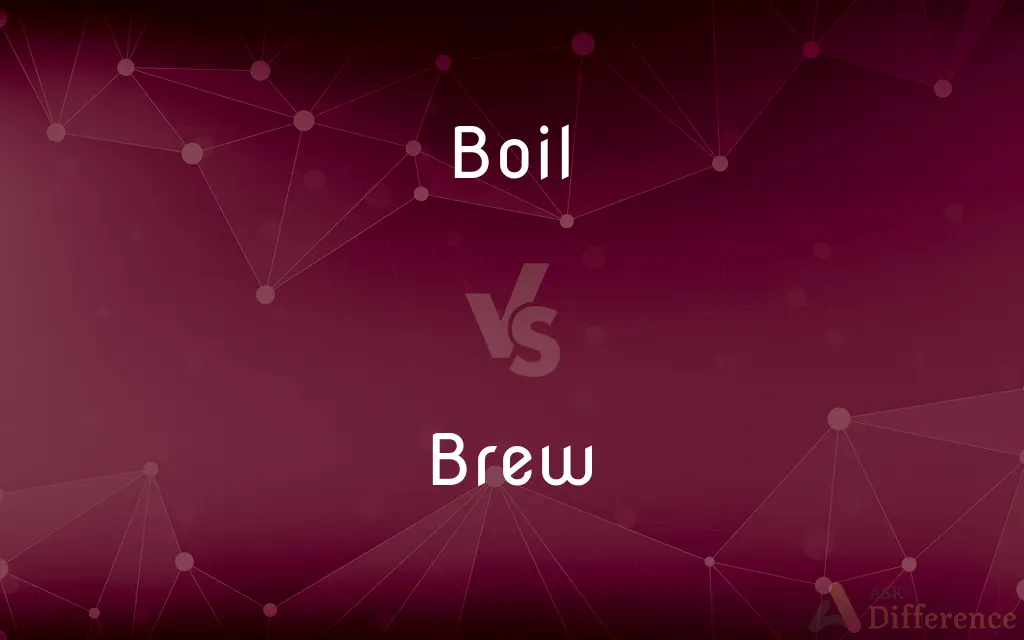Boil vs. Brew — What's the Difference?
By Urooj Arif & Fiza Rafique — Updated on April 16, 2024
Boiling is the process of heating a liquid until it reaches its boiling point and vaporizes; brewing involves soaking a substance (often coffee or tea) in hot water to extract flavors.

Difference Between Boil and Brew
Table of Contents
ADVERTISEMENT
Key Differences
Boiling involves heating a liquid to a temperature where it begins to vaporize and form bubbles, commonly used for cooking or sterilizing. On the other hand, brewing is a process specifically aimed at extracting flavors and active compounds from items like tea leaves, coffee grounds, or herbs into water.
While boiling is a simple heat application that can apply to many types of liquids and substances, brewing is a more delicate technique that typically requires specific temperatures and times to optimize flavor extraction from organic materials.
Boiling can be a part of many cooking processes, from making pasta to preparing vegetables. Brewing, however, is almost exclusively associated with the preparation of beverages and occasionally broths, emphasizing the importance of time and temperature in achieving the desired strength and flavor.
The term "boil" is used universally in culinary and scientific contexts, indicating the physical state of a liquid at a specific temperature (100°C or 212°F at sea level for water). "Brew" is more culturally and contextually specific, often related to culinary traditions surrounding beverages like tea and coffee.
Boiling is primarily a physical change affecting the state of the liquid, potentially altering textures and killing microbes. Brewing, however, is both a physical and chemical process that involves the diffusion of flavors and chemical components into water, creating a new substance entirely.
ADVERTISEMENT
Comparison Chart
Definition
Heating a liquid to its boiling point
Soaking a substance to extract flavors
Primary Purpose
To cook, sterilize, or change state
To extract flavors and compounds
Associated Substances
Any liquid (water, broth, etc.)
Tea, coffee, herbs
Process Type
Physical change (vaporization)
Chemical and physical change (extraction)
Typical Use
Cooking various foods, sterilizing
Making beverages like tea and coffee
Compare with Definitions
Boil
The process of cooking or sterilizing by boiling.
Boil the jars to sterilize them before canning.
Brew
The extraction process involving hot water and organic matter.
Let the tea brew for a few minutes before drinking.
Boil
Can apply to any liquid under sufficient heat.
He lowered the heat once the sauce began to boil.
Brew
The method of making coffee or tea by steeping in hot water.
She loves to brew fresh coffee each morning.
Boil
Heating a liquid until it bubbles and turns to vapor.
She waited for the water to boil to add the pasta.
Brew
Often involves cultural and traditional practices.
Brewing sake is an ancient Japanese tradition.
Boil
Used universally in cooking and scientific contexts.
The experiment required the solution to boil for five minutes.
Brew
Specific to the preparation of beverages.
He learned how to brew beer at home.
Boil
Rapid vaporization of a liquid.
Bring the broth to a boil before adding vegetables.
Brew
Requires careful control of temperature and time.
Brewing the perfect cup of tea requires precise timing.
Boil
A boil, also called a furuncle, is a deep folliculitis, infection of the hair follicle. It is most commonly caused by infection by the bacterium Staphylococcus aureus, resulting in a painful swollen area on the skin caused by an accumulation of pus and dead tissue.
Brew
Make (beer) by soaking, boiling, and fermentation
Within five years the company will brew as much beer in China as in Australia
The brewing industry
Boil
(with reference to a liquid) reach or cause to reach the temperature at which it bubbles and turns to vapour
We asked people to boil their drinking water
He waited for the water to boil
Brew
Make (tea or coffee) by mixing it with hot water
I've just brewed some coffee
Boil
(with reference to food) cook or be cooked by immersing in boiling water or stock
Make the sauce while the lobsters are boiling
Boil the potatoes until well done
Brew
(of an unwelcome event or situation) begin to develop
A storm was brewing
There was more trouble brewing as the miners went on strike
Boil
(of the sea or clouds) be turbulent and stormy
A huge cliff with the black sea boiling below
Brew
A kind of beer
Small breweries which are able to offer rare brews
Boil
The temperature at which a liquid bubbles and turns to vapour
Bring the sauce to the boil and simmer for 10 minutes
Brew
A cup or mug of tea or coffee
She took a sip of the hot reviving brew
Boil
A casual outdoor meal at which shellfish is prepared by boiling
The reappearance of warm days signals another revival: weekend crawfish boils
Brew
A mixture of events, people, or things which interact to form a more potent whole
A dangerous brew of political turmoil and violent conflict
Boil
An inflamed pus-filled swelling on the skin, caused typically by the infection of a hair follicle.
Brew
To make (ale or beer) from malt and hops by infusion, boiling, and fermentation.
Boil
To change from a liquid to a vapor by the application of heat
All the water boiled away and left the kettle dry.
Brew
To make (a beverage) by boiling, steeping, or mixing various ingredients
Brew tea.
Boil
To reach the boiling point.
Brew
To concoct; devise
Brew a plot to overthrow the government.
Boil
To undergo the action of boiling, especially in being cooked.
Brew
To make ale or beer as an occupation.
Boil
To be in a state of agitation; seethe
A river boiling over the rocks.
Brew
To be made by boiling or steeping
As the coffee brewed, I paced in the kitchen.
Boil
To be stirred up or greatly excited, especially in anger
The mere idea made me boil.
Brew
To be imminent; impend
"storms brewing on every frontier" (John Dos Passos).
Boil
To vaporize (a liquid) by the application of heat.
Brew
A beverage made by brewing.
Boil
To heat to the boiling point.
Brew
A serving of such a beverage.
Boil
To cook or clean by boiling.
Brew
Something produced as if by brewing; a mix
Their politics were a strange brew of idealism and self-interest.
Boil
To separate by evaporation in the process of boiling
Boil the maple sap.
Brew
To make tea or coffee by mixing tea leaves or coffee beans with hot water.
Boil
The condition or act of boiling.
Brew
(transitive) To heat wine, infusing it with spices; to mull.
Boil
Lower Southern US A picnic featuring shrimp, crab, or crayfish boiled in large pots with spices, and then shelled and eaten by hand.
Brew
To make a hot soup by combining ingredients and boiling them in water.
Boil
An agitated, swirling, roiling mass of liquid
"Those tumbling boils show a dissolving bar and a changing channel there" (Mark Twain).
Brew
To make beer by steeping a starch source in water and fermenting the resulting sweet liquid with yeast.
Boil
A painful, circumscribed pus-filled inflammation of the skin and subcutaneous tissue usually caused by a local staphylococcal infection. Also called furuncle.
Brew
(transitive) To foment or prepare, as by brewing
Boil
A localized accumulation of pus in the skin, resulting from infection.
Brew
(intransitive) To attend to the business, or go through the processes, of brewing or making beer.
Boil
The point at which fluid begins to change to a vapour; the boiling point.
Add the noodles when the water comes to the boil.
Brew
To be in a state of preparation; to be mixing, forming, or gathering.
Boil
A dish of boiled food, especially based on seafood.
Brew
To boil or seethe; to cook.
Boil
The collective noun for a group of hawks.
Brew
The mixture formed by brewing; that which is brewed; a brewage, such as tea or beer.
Boil
A bubbling.
Brew
(slang) A serving of beer.
Boil
To heat to the point where it begins to turn into a gas.
Boil some water in a pan.
Brew
A cup of tea.
Boil
(ambitransitive) To cook in boiling water.
Boil the eggs for three minutes.
Is the rice boiling yet?
Brew
An overhanging hill or cliff.
Boil
To begin to turn into a gas, seethe.
Pure water boils at 100 degrees Celsius.
Brew
To boil or seethe; to cook.
Boil
To bring to a boil, to heat so as to cause the contents to boil.
Brew
To prepare, as beer or other liquor, from malt and hops, or from other materials, by steeping, boiling, and fermentation.
Boil
To be uncomfortably hot.
It’s boiling outside!
Brew
To prepare by steeping and mingling; to concoct.
Go, brew me a pottle of sack finely.
Boil
To feel uncomfortably hot.
I’m boiling in here – could you open the window?
Brew
To foment or prepare, as by brewing; to contrive; to plot; to concoct; to hatch; as, to brew mischief.
Hence with thy brewed enchantments, foul deceiver!
Boil
(transitive) To form, or separate, by boiling or evaporation.
To boil sugar or salt
Brew
To attend to the business, or go through the processes, of brewing or making beer.
I wash, wring, brew, bake, scour.
Boil
(obsolete) To steep or soak in warm water.
Brew
To be in a state of preparation; to be mixing, forming, or gathering; as, a storm brews in the west.
There is some ill a-brewing towards my rest.
Boil
To be agitated like boiling water; to bubble; to effervesce.
The boiling waves of the sea
Brew
The mixture formed by brewing; that which is brewed.
Boil
To be agitated, or tumultuously moved, as a liquid by the generation and rising of bubbles of steam (or vapor), or of currents produced by heating it to the boiling point; to be in a state of ebullition; as, the water boils.
Brew
Drink made by steeping and boiling and fermenting rather than distilling
Boil
To be agitated like boiling water, by any other cause than heat; to bubble; to effervesce; as, the boiling waves.
He maketh the deep to boil like a pot.
Brew
Prepare by brewing;
People have been brewing beer for thousands of years
Boil
To pass from a liquid to an aëriform state or vapor when heated; as, the water boils away.
Brew
Sit or let sit in boiling water so as to extract the flavor;
The tea is brewing
Boil
To be in boiling water, as in cooking; as, the potatoes are boiling.
Boil
To heat to the boiling point, or so as to cause ebullition; as, to boil water.
Boil
To form, or separate, by boiling or evaporation; as, to boil sugar or salt.
Boil
To subject to the action of heat in a boiling liquid so as to produce some specific effect, as cooking, cleansing, etc.; as, to boil meat; to boil clothes.
The stomach cook is for the hall,And boileth meate for them all.
Boil
To steep or soak in warm water.
To try whether seeds be old or new, the sense can not inform; but if you boil them in water, the new seeds will sprout sooner.
Boil
Act or state of boiling.
Boil
A painful sore with a hard pus-filled core
Boil
The temperature at which a liquid boils at sea level;
The brought to water to a boil
Boil
Come to the boiling point and change from a liquid to vapor;
Water boils at 100 degrees Celsius
Boil
Cook in boiling liquid;
Boil potatoes
Boil
Bring to, or maintain at, the boiling point;
Boil this liquid until it evaporates
Boil
Be agitated;
The sea was churning in the storm
Boil
Be in an agitated emotional state;
The customer was seething with anger
Common Curiosities
What does boil mean?
To boil means to heat a liquid until it reaches a temperature where it begins to vaporize and form bubbles.
What is the difference in equipment for boiling and brewing?
Boiling can be done in any heat-resistant container, while brewing often requires specific equipment like teapots, coffee makers, or brewing vessels.
How do you know when a liquid is boiling?
A liquid is boiling when it reaches its boiling point and you can see vigorous bubbles forming and rising to the surface.
Are there different methods of brewing tea?
Yes, methods vary by the type of tea, temperature, and steeping time, including special techniques like the Chinese Gongfu tea ceremony.
What does brew mean?
To brew typically refers to the process of making beverages like tea or coffee by soaking the ground or leaves in hot water to extract flavors.
Can you brew soup?
Technically, brewing is not a term commonly used for soup; however, simmering could be considered similar as it involves extracting flavors under heat.
Is boiling necessary for brewing?
Boiling water is often a precursor to brewing, especially for tea and coffee, to ensure the water is hot enough to extract flavors effectively.
Can I brew beverages without hot water?
Cold brewing, especially for coffee and tea, involves steeping the grounds or leaves in cold water over an extended period.
What is the optimal temperature for brewing coffee?
The optimal brewing temperature for coffee is typically between 195°F to 205°F (90°C to 96°C).
Why is boiling important in cooking?
Boiling is essential for cooking foods thoroughly, making them safe and palatable to eat.
Can all drinks be brewed?
Not all drinks are brewed; some are mixed, fermented, or distilled.
What are the health implications of boiling vs. brewing?
Boiling can kill bacteria and make water safe to drink, while brewing, particularly of tea and coffee, can extract beneficial antioxidants.
What is a rolling boil?
A rolling boil is a vigorous state of boiling that cannot be disrupted by stirring.
What are some common mistakes in brewing tea?
Common mistakes include using water that is too hot or too cold, steeping for too long or too short, and using poor quality tea leaves.
Share Your Discovery

Previous Comparison
Cousin vs. Niece
Next Comparison
Counselor vs. ConsigliereAuthor Spotlight
Written by
Urooj ArifUrooj is a skilled content writer at Ask Difference, known for her exceptional ability to simplify complex topics into engaging and informative content. With a passion for research and a flair for clear, concise writing, she consistently delivers articles that resonate with our diverse audience.
Co-written by
Fiza RafiqueFiza Rafique is a skilled content writer at AskDifference.com, where she meticulously refines and enhances written pieces. Drawing from her vast editorial expertise, Fiza ensures clarity, accuracy, and precision in every article. Passionate about language, she continually seeks to elevate the quality of content for readers worldwide.















































